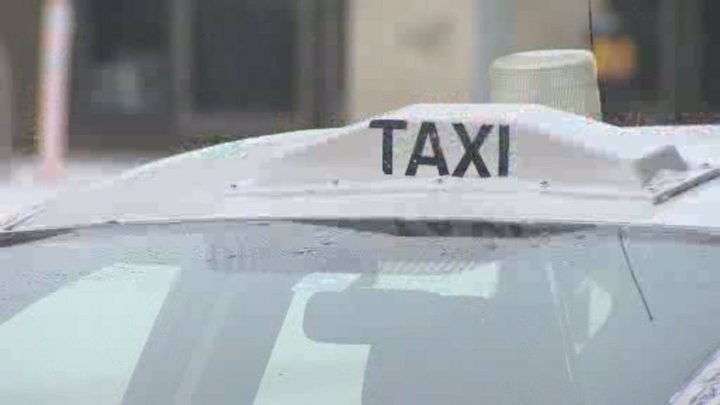It’s a topic of discussion that is guaranteed to get a rise out of people — taxis.

Ask anyone if they’ve ever had a bad experience in a cab and you can be sure to get an earful, especially in Winnipeg.
Grant Heather, manager of Vehicles for Hire at the City of Winnipeg, said taxis are a hot topic for travellers no matter where you go.
“This is an industry that has had a relative monopoly for many years,” Heather said.
While ridesharing services like Uber and TappCar have brought competition to the transportation industry and new options for passengers, Heather says they have barely begun to scratch the surface here in Winnipeg.
“Taxis provide 85-90 per cent of the service in Winnipeg right now.”
The City of Winnipeg took over regulation and management of for-hire services in the spring of 2018, following the dissolution of the Taxicab Board.
- Michael Kovrig reflects on ‘brutally hard’ Chinese detention: ‘You’re totally alone’
- Conservatives set to table non-confidence motion Tuesday. What to expect
- After controversial directive, Quebec now says anglophones have right to English health services
- Something’s fishy: 1 in 5 seafood products are mislabelled, study finds
During its existence, there were several hundred complaints a year made to the board. Heather says having the governance of for-hire services managed by the Parking Authority allows for improvements to the industry overall.
There have been 68 complaints received through the city’s 311 service since March 1, 2018. While that number includes both taxi cabs and ride-sharing services, Heather admitted most of the complaints were about taxis. He suggested that is likely for two reasons:
- Cabs are still providing the majority of for-hire services, and have access to higher traffic venues such as the airport.
- Ridesharing services like TappCar have their own means of recording “complaints” via their online rating system. Riders are less likely to make formal complaints to the city when they can have a more immediate impact by using the app.
The city-run system outlines three avenues for submitting complaints, which are spelled out on their website.
- The first is an immediate call to 911 if it involves a criminal or emergent matter.
- The second is to the dispatcher or cab company directly, for any customer service matters.
- The final is a call to 311.

Get breaking National news
Heather said he couldn’t provide numbers as to how many calls might have gone directly through to police.
“I’m confident that the police get all aspects of complaints, but not all of them are criminal… we haven’t been notified of anything serious that would require suspension of a driver’s licence,” he said.
Of the complaints received by the city, Heather said some have been referred back to the dispatch companies, and a few have been passed along to police, adding they take complaints very seriously.
“The overall industry has made many positive strides. There is still a ways to go in some areas.”
WATCH: Winnipeg taxis make changes ahead of arrival of ridesharing competition
-_TOR1BYJF_848x480_1166615619639.jpg?w=1040&quality=70&strip=all)
Heather said they are currently working on improvements to their website to make information easier to access for passengers and drivers. The plan is to have something of a “bill of rights” available for viewing so everyone knows what they can reasonably expect when hiring, or operating, a vehicle for hire.
Advisory Committee
Heather said as the ridesharing industry continues to evolve, the city is working on a number of improvements to their process as well as their website.
An advisory committee of 14 industry stakeholders — people who are connected to the industry, the community and taxi-dependent services — has been in place since early July. The group will meet once a month with a goal to “hear the voices of the people.”
Heather said the committee allows for the sharing of perspectives, ideas and expertise.
“Instead of us as the regulator dictating, we’re getting input,” he said.
What are the rules?
Heather said there are a lot of misconceptions floating around as to what the rules really are with respect to riders and rates for cabs.
Myth: A passenger doesn’t have to pay if the meter isn’t turned on.
“That is like leaving a restaurant without paying, after you have eaten your meal, because the server didn’t give you a bill,” Heather said. In the unlikely event that a driver forgets to turn on the meter, you should still expect to pay a reasonable rate for the ride.
Myth: Drivers are not allowed to suggest off-fare rates.
Drivers are allowed to negotiate a flat rate for a trip, as long as it is done before the ride begins. The passenger always has the option to accept or decline. Either way, the meter should be turned on for every trip.
“We allow pre-payment of fare,” Heather said. “It gives drivers an opportunity to accept lower fares… drivers are fighting for fares and this is a customer service business.”
Another issue that needs to be cleared up is the matter of paying for wait-time.
If a cab is ordered for a specific time and shows up early, the passenger should not be expected to pay for the extra time.
“That’s the same as a cab waiting at the airport for a passenger. The passenger doesn’t have to pay for the time the cab sat there before they arrived.”
However, if a passenger, once the trip has begun and the meter is running, asks the driver to stop at a store so they can pick up something and makes the cab wait while they shop, the driver deserves to be paid.
“If you get into a car and make the driver wait, you should be paying for that time.”
Heather said a list of questions and answers for drivers are included on the city website. He said while there is not currently a set of questions and answers for passengers, they would simply be the inverse of the ones for drivers.








Comments